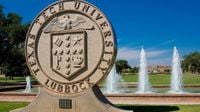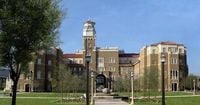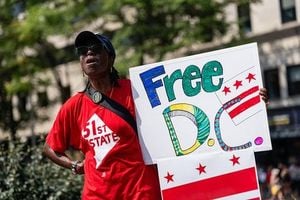On a Friday afternoon in September 2025, the campus of Texas Tech University was shaken by an incident that has since sparked a heated national conversation about free speech, campus conduct, and the boundaries of protest. Eighteen-year-old Camryn Giselle Booker, a student at the university, was arrested and expelled after a video went viral showing her making inflammatory remarks at a vigil held in memory of conservative activist and Turning Point USA founder Charlie Kirk, who had been recently assassinated.
The vigil, organized by students near the university’s Student Union Building, was meant as a somber remembrance for Kirk, whose death at Utah Valley University had already sent shockwaves through political circles and college campuses across the country. According to Fox News and NDTV, the event took a dramatic turn when Booker approached the gathering and began shouting at those present, hurling expletives and taunting the mourners. In widely circulated footage, she can be heard yelling, “F--k y’all homie dead, he got shot in the head,” and in another moment, “F— your homie dead, he got shot in the neck.” The video captures Booker confronting a man wearing a red “Make America Great Again” hat, escalating tensions as she repeatedly questioned why he was being hateful toward her.
The confrontation quickly drew the attention of Texas Tech police officers, who witnessed Booker slap the lid of the man’s hat—a move that would form the basis of the assault charge against her. The man, later identified as Cameron Payne, told KAMC and Fox News, “I was standing there, and she walked up out of nowhere screaming all things about him. Then she started using the race card. Then it turned into a whole different argument that it never should have been. The sign says rest in peace. If you don’t like it, leave me alone.”
Payne, though shaken by the confrontation, ultimately chose not to press charges. “I thought she’s young, she’s emotional,” he reflected. “She’s been twisted by an evil, evil ideology that laughs when you are murdered. I wanted to drop the charges, but it was just too late for her.” Despite his decision, the state chose to pursue the case, and Booker was arrested on September 12, 2025, charged with simple assault—a Class C misdemeanor in Texas, the lowest level of criminal offense. Texas Tech Police confirmed her arrest, stating, “The Texas Tech Police Department arrested a student for simple assault, which occurred on the west side of the Student Union Building (free speech area). The student was transported to the Lubbock County Jail.”
Booker was released from jail on Saturday, September 13, after posting a $200 bond, according to the Lubbock County Sheriff’s Office. The following Monday, Texas Tech University confirmed she was no longer enrolled, emphasizing its stance in a public statement: “Any behavior that denigrates victims of violence is reprehensible, has no place on our campus, and is not aligned with our values. Federal law prevents Texas Tech University from commenting on individual student conduct matters. We take all reported violations seriously and address them under university policy and the law.”
The university’s swift action and the viral nature of the video ignited debate both on campus and online about the limits of free speech at public institutions. As Black Enterprise and Fox News reported, Texas Tech is a public university, which means First Amendment protections apply. The U.S. Supreme Court has repeatedly described college campuses as “marketplaces of ideas,” but Texas Tech’s code of conduct also reserves the right to intervene when student behavior infringes on the rights of others or undermines the university’s educational mission.
Booker’s comments, which included references to her identity and accusations of racial bias—“You’re calling me aggressive because I’m a Black woman”—added another layer to the controversy, raising questions about how race, protest, and campus discipline intersect. When accused of being emotional, Booker retorted, “I’m not being emotional, ma’am. Don’t tell me what I am and what I’m not. You could get out of my face 'cause I can tell you what you are, but you won’t like it.”
Governor Greg Abbott of Texas, never one to shy away from the spotlight, weighed in on the incident via X (formerly Twitter) on September 14, 2025. He posted a photo of Booker being arrested, writing, “This is what happened to the person who was mocking Charlie Kirk’s assassination at Texas Tech. FAFO.” The governor’s post was quickly shared by Texas Tech Regent Cody Campbell, who added, “We, @TexasTech, are proud of our values and are not afraid to stand up for them. Strive for Honor Evermore! Long Live the Matadors!”
The fallout from Booker’s arrest extended beyond Lubbock. In the days that followed, Governor Abbott called for the expulsion of a student at Texas State University who was seen in another video mocking Kirk’s death at a separate memorial event. Texas State University President Dr. Kelly Damphousse responded with a statement promising swift action: “Behavior that trivializes or promotes violence is reprehensible and violates the values of TXST. It will not be tolerated. If this individual is found to be affiliated with TXST, appropriate action will be taken. Let me be clear: expressions that glorify violence or murder have no place on our campuses.”
Booker’s legal troubles may not be over. While the most widely reported charge is simple assault, some outlets, including NDTV, have listed additional charges such as battery, disorderly conduct, and resisting arrest. However, the Lubbock County Sheriff’s Office and Texas Tech Police have publicly confirmed only the assault charge as of this writing.
The incident and its aftermath have exposed deep divides within the university community and beyond. Some students and commentators have argued that Booker’s actions, while offensive and disruptive, nonetheless fall under the umbrella of protected speech, especially given the emotionally charged atmosphere following Kirk’s assassination. Others contend that her conduct—particularly the physical altercation and the taunting of mourners—crossed a line, justifying disciplinary and legal action.
For Cameron Payne, the student targeted by Booker, the experience has been sobering but not embittering. “I really do wish better for her life and whatever it looks like going forward because of her actions,” he told reporters. The university, for its part, has reiterated its commitment to both free expression and campus safety, stating that it will continue to address violations “under university policy and the law.”
As the dust settles, Texas Tech’s response—and the broader debate it has fueled—serves as a vivid reminder of the challenges universities face in balancing the rights of students to speak their minds with the need to maintain a respectful and safe environment. The incident may be over, but the questions it raises about speech, protest, and accountability on campus are far from settled.






